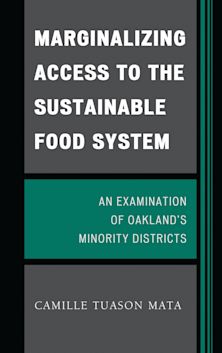Intersections of Race, Gender, and Precarity
Navigating Insecurities in an American City
Intersections of Race, Gender, and Precarity
Navigating Insecurities in an American City
This product is usually dispatched within 3 days
- Delivery and returns info
-
Free US delivery on orders $35 or over
Description
In Intersections of Race, Gender, and Precarity: Navigating Insecurities in an American City, Stephanie Baran argues that when it comes to assistance the United States government often creates more problems than it solves. These institutions are not in the business of creating a pathway for people to escape poverty, often compounding that poverty instead. Through a two-year ethnographic study of poverty and insecurity in Milwaukee, Wisconsin, the author shows how people navigate situations of poverty through interviews with recipients and organizations as well as those working at a local community pantry. Consequently, research uncovered how local food organizations with connections to the Milwaukee Chapter of the Black Panther Party hide their more radical roots to protect food donations from white donors, in essence protecting white fragility. People are far closer to experiencing poverty than they realize, as shown by the Government Shutdown of 2019 and the ongoing COVID-19 pandemic, and typically have incomplete and inaccurate ideas of poverty as well as how people can experience upward mobility. Intersections of Race, Gender, and Precarity reveals this gap through a focus on how all these factors show up in Milwaukee, Wisconsin.
Table of Contents
List of Figures
Abbreviations
Preface
Acknowledgments
Note on Methodology
Introduction
Chapter 1 “Let's go eat in the office”: Life at a Milwaukee Food Pantry
Chapter 2 Benefits: How Public Perceptions Hurt Recipient Access
Chapter 3 Perceptions of Poverty
Chapter 4 Food Insecurity in an American City
Chapter 5 Outside the pantry
Chapter 6 What happens when a government 'fails' to act?
Chapter 7 “I feel like a rat in a race”: The Benefit Experience
Chapter 8 Hunger Task Force: Your Free & Local Food Bank
Conclusion An Ode to My Time at Feed the Need
Bibliography
About the Author
Product details
| Published | Aug 22 2023 |
|---|---|
| Format | Paperback |
| Edition | 1st |
| Extent | 234 |
| ISBN | 9781793608550 |
| Imprint | Lexington Books |
| Illustrations | 1 b/w illustrations;25 b/w photos; |
| Dimensions | 9 x 6 inches |
| Publisher | Bloomsbury Publishing |
Reviews

ONLINE RESOURCES
Bloomsbury Collections
This book is available on Bloomsbury Collections where your library has access.

































